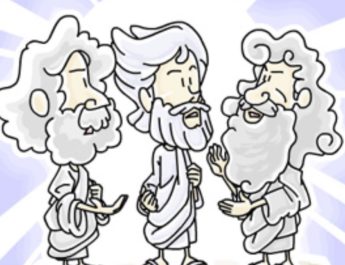Luke 18:9-14
Ordinary C48
9 He also told this parableA to some who trustedB in themselves that they were righteousC and regarded othersD with contempt:E
A “parable” = parabole. From paraballo (literally to throw beside, compare, arrive, liken); {from para (by, beside, in the presence of) + ballo (to throw, cast, place, put, drop)}. This is a parable, comparison, adage. Quite often a tale told or a metaphor to establish a point, but it could be a true story.
B “trusted” = peitho. This is to have confidence, to urge, be persuaded, agree, assure, believe, have confidence, trust. It is the root from which the Greek word for faith is drawn (pistis).
C “righteous” = dikaios. From dike (the principle of justice; that which is right in a way that is very clear; a decision or the execution of that decision; originally, this word was for custom or usage; evolved to include the process of law, judicial hearing, execution of sentence, penalty, and even vengeance; more commonly, it refers to what is right); may be from deiknumi (to show, point out, exhibit; figurative for teach, demonstrate, make known). This is correct, righteous, just, or a righteous person. It implies innocent or conforming to God’s standard of justice.
D “others” = loipos. From leipo (to leave behind, be lacking). This is the rest, remained, remnant, other, residue.
E “regarded…with contempt” = exoutheneo. 11x in NT. From ek (from, from out of) + oudeis (no one, none, nothing; ruling out absolutely); {from oude (and not, neither, not even) {from ou (not, no) + de (but, and, now, indeed)} + heis (one, first, alone)}. Properly, this is casting someone or something out as nothing, consider someone or something nothing – of no account. This would be to treat someone with utter contempt or to ignore them.
10 “Two menF went upG to the templeH to pray,I
F “men” = anthropos. Probably from aner (man, male, husband) + ops (eye, face). This is human, humankind. Used for all genders.
G “went up” = anabaino. From ana (up, back, among, again, anew) + the same as basis (step, hence foot; a pace); {from baino (to walk, to go)}. This is to come up in a literal or figurative sense – ascent, rise, climb, enter.
H “temple” = hieron. From hieros (sacred, something sacred, temple, holy, set apart; something consecrated to a god). This is the word for temple.
I “pray” = proseuchomai. From pros (advantageous for, at, toward) + euchomai (to wish, make a request, pray). This is to pray or pray for, to worship or supplicate. It is more literally exchanging one’s own wishes for God’s.
one a PhariseeJ and the otherK a tax collector.L
J “Pharisee” = Pharisaios. From Aramaic peras (to divide, separate) and from Hebrew parash (to make distinct, separate, scatter). This is a Pharisee, a member of a Jewish sect active in the 1st century. Their name meant separate in the sense of wanting to live a life separated from sin. Whereas the Sadducees were part of the priestly line and inherited their religious position and responsibilities, Pharisees were regular people who studied the scriptures and offered guidance to regular folk. Sadducees were often wealthier and willing to sacrifice their identity to rub elbows with Roman society. Pharisees were often more concerned with what it meant to follow God without compromising what made them different as followers of God. Sadducees primarily believed in that which was written down (the first five books of the Bible) and Pharisees believed in the Bible and the traditions of the elders. Pharisees had a very wide range of interpretations and diversity of opinion. Their standard mode of religious engagement was lively debate with one another. To argue religion with another teacher was to recognize that they had something of value to offer.
K “other” = heteros. This is other, another, different, strange. It is another of a different kind in contrast to the Greek word allos, which is another of the same kind. This could be a different quality, type, or group.
L “tax collector” = telones. From telos (an end, aim, purpose, completion, end goal, consummation, tax; going through the steps to complete a stage or phase and then moving on to the next one). This is tax collector, one who worked for the Romans taking taxes from Jews. It also meant the toll house. Literally, this is “paying at the end.”
11 The Pharisee, standingM by himself, was praying thus, ‘God,N I thankO you that I am not like otherP people:Q
M “standing” = histemi. This is to stand, place, establish, appoint, stand ready, be steadfast.
N “God” = Theos. From Proto-Indo-European origins, meaning do, put, place. This is God or a god in general.
O “thank” = eucharisteo. From eu (good, well, well done, rightly) + charis (grace, kindness, favor, gratitude, thanks; being inclined to or favorable towards – leaning towards someone to share some good or benefit; literal, figurative, or spiritual; grace as abstract concept, manner, or action); {from chairo (to rejoice, be glad; used to say hello; properly, delighting in the grace of God or experiencing God’s favor); from char– (to extend favor, lean towards, be inclined to be favorable towards)}. This is giving thanks, being thankful. It is a recognition that God’s grace is good and actively showing gratitude. It can also be used for saying grace before eating. This is where “eucharist” comes from.
P “other” = loipos. Same as “others” in v9. See note D above.
Q “people” = anthropos. Same as “men” in v10. See note F above.
thieves,R rogues,S adulterers,T or even like this tax collector.
R “thieves” = harpax. 5x in NT. From harpazo (to seize by force, snatch away); from haireo (to choose, take). This is seizing suddenly, ravenous, ferocious, a thief, swindler.
S “rogues” = adikos. Related to “righteous” in v9. 12x in NT. From from a (not, without) + dike (see note C above). This is unjust, unrighteous, wicked, treacherous.
T “adulterers” = moichos. 3x in NT. This is adulterer; a man who has been with a married woman. Figuratively, an apostate.
12 I fastU twice a week;V I give a tenthW of all my income.’X
U “fast” = nesteuo. From a (not, without) + esthio (to eat or figuratively to devour or consume like rust). This is to fast, not eat food, to make a religious fast.
V “week” = sabbaton. From Hebrew shabbath (sabbath); from shabath (to rest, stop, repose, cease working; by implication, to celebrate). This is the sabbath. It can also be used as shorthand for a week i.e. the time between two sabbaths.
W “give a tenth” = apodekatoo. 4x in NT. From apo (from, away from) + dekatoo (to tithe or gather tithes); {from dekate (a tenth or tithe); from deka (ten or -teen)}. This is to give or take a tithe – a tenth part.
X “income” = ktaomai. 7x in NT. This is to get, purchase, acquire, gain.
13 But the tax collector, standing far off, wouldY not even look upZ to heaven,AA
Y “would” = thelo. This is to wish, desire, will, or intend. It is to choose or prefer in a literal or figurative sense. It can also mean inclined toward or take delight in. It can have a sense of being ready to act on the impulse in question.
Z “look up” = ophthalmos + epairo. Literally “lift up the eyes.” Ophthalmos is from optanomai (to appear, be seen by). This is eye or sight. It is used figuratively for the mind’s eye, a vision, or for envy. Epairo is 19x in NT. From epi (on, upon, among, what is fitting) + airo (raise, take up, lift, remove). This is to lift up or raise in a literal or figurative sense. Figuratively, it could mean to exalt oneself.
AA “heaven” = ouranos. May be related to oros (mountain, hill) with the notion of height. This is the air, the sky, the atmosphere, and heaven. It is the sky that is visible and the spiritual heaven where God dwells. Heaven implies happiness, power, and eternity.
but was beatingBB his breastCC and saying, ‘God, be mercifulDD to me, a sinner!’EE
BB “beating” = tupto. 14x in NT. This is to strike, beat, or wound – generally with a stick or cudgel. It is hitting with repeated blows. So, it contrasts with paiso and patasso, which describe single blows by hand or weapon. Also contrast plesso (beating with a fist or hammer), rhapizo (to slap), and tugchaono (hitting accidentally). This word is hitting to punish. Figuratively, it can refer to being offended.
CC “breast” = stethos. Related to “standing” in v11. 5x in NT. Perhaps from histemi (see note M above). This is the chest or bosom.
DD “be merciful” = hilaskomai. Related to “look up” in v13. 2x in NT. From the same as hileos (forgiving, merciful, gracious, cheerful as benevolent; a way to say “far be it”); from hilaos (gracious, benevolent) or from haireomai (to take, choose, or prefer) {probably related to airo (see note Z above)}. This is to make propitiation i.e. a sacrifice of atonement, to be merciful, reconcile, forgive, show favor.
EE “sinner” = hamartolos. From hamartano (to miss the mark, do wrong, make a mistake, sin); {from a (not) + meros (a part or share)}. This is sinning, sinful, sinner. It referred to missing the mark or falling short. The term was also used in archery for missing the target.
14 I tell you, this man went downFF to his homeGG justifiedHH rather than the other; for all who exaltII themselves will be humbled,JJ but all who humble themselves will be exalted.”
FF “went down” = katabaino. Related to “went up” in v10. From kata (down, against, throughout, among) + baino (see note G above). This is to come down whether from the sky to the ground or from higher ground to lower. It can be used in a literal or figurative sense.
GG “home” = oikos. This is house – the building, the household, the family, descendants, the temple.
HH “justified” = dikaioo. Related to “righteous” in v9 & “rogues” in v11. From dikaios (see note C above). This is to be righteous, plead the cause of, justify, acquit. Properly, it is being approved, particularly carrying the weight of a legal judgment. It is upright, render just, or innocent.
II “exalt” = hupsoo. From hupsos (height, high position, heaven, dignity, eminence; elevation, altitude; to be exalted); from hupsi (on high, aloft); from huper (over, above, beyond). This is to elevate in a literal or figurative sense. So it could be to raise up or set something in a high place or to exalt or make something great.
JJ “humbled” = tapeinoo. 14x in NT. From tapeinos (low in position, depressed, low in circumstance; fig humiliated, low in spirit). This is bringing someone or something low. Figuratively to humble or humiliate – to depress or abase.
Image credit: “The Pharisee and the Public” by James Tissot, between 1886 and 1894.




